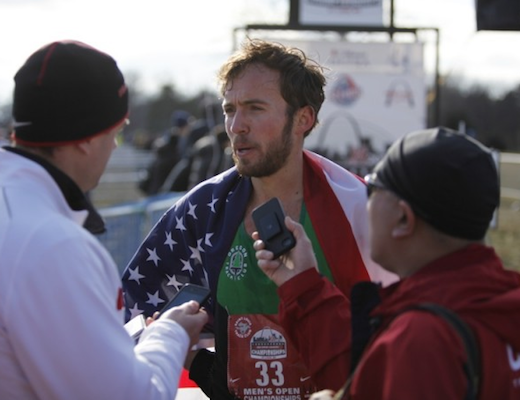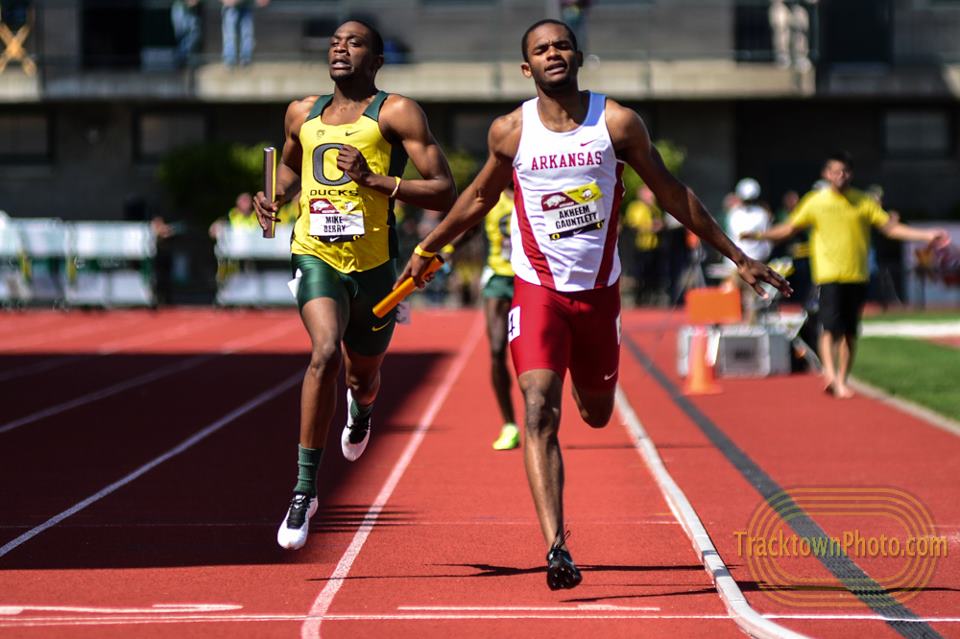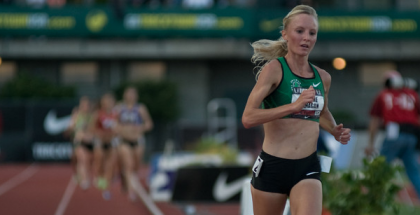5 Questions with Chris Derrick
photo: Runnerspace
A year after missing out on making Team USA with a fourth-place finish in the 10,000m at the Olympic Trials in Eugene, Chris Derrick fought for third on a hot night in Des Moines to make the plane to Moscow.
That performance was just one of many accomplishments in Derrick’s first full year as a pro. He also finished first in the USA Cross Country Championships and then placed 10th in the subsequent World Cross Country Championships. After an injury limited his pre-Worlds training — he would finish 18th — Derrick completed the heart of his 2013 season by setting a personal best of 13:08 in the Brussels Diamond League meet in early September.
We sat down with the Stanford alum when he was in New York for the Dash to the Finish Line 5K in early November (he’d finish ninth in 14-flat). Derrick discussed making the World Championships team, that bizarre 5,000m race at USAs, the Stanford-Oregon rivalry and more. Follow Chris on Twitter @CDerrickRun
5 Questions with Chris Derrick
What was the 10,000m like at USAs? How did you feel going into it? A lot of people thought there was really only one spot up for grabs and you got it.
Derrick: That’s one of the most high anxiety situations I’ve ever been in — so much building up to just making the team for weeks in advance. It went out really slow, and I had put myself in second, which I think was good, ’cause I didn’t have to look at anyone or think about anybody else — just run really easy for a while. I was there to cover the moves.
And Dathan [Ritzenheim] made the big move. It was definitely tough running, and I looked around — looked at the big screen with a “K” to go — and I saw we had like 40 meters all of a sudden, and that’s the first I knew that it wasn’t five guys in a group. It was just a huge relief at that point. I probably didn’t finish as well as I could have — Jerry [Schumacher] got on me for that: “You can’t just be happy just to make the team.” I was like, “Just this once, can I just be happy to make the team?”
It was a big relief to make the team — a lot of tension building up, especially with how slow it went for so long. It’s always an abrupt transition when you go from real slow like that to picking it up. You don’t feel very good at all. You expect you would feel really fresh.
[Did you work on that transition in training?]
Derrick: We didn’t do that much. We’d work on the constituent parts of that. We did strength work, we did faster stuff and all that kind of stuff. Maybe earlier in the year we did some tempos, some repeat miles. But that’s something that it’s more just a mental thing. You just have to remind yourself that your body is clearly capable of running this pace, and you need to get into a rhythm and establish that and you’ll be fine. So, that’s what I was able to do. Thankfully, it was the three of us away and clear.
Were you able to watch the 5,000m final a few days later? What did you think of that race and the slow pace in particular?
Derrick: I was on the backstretch, obviously supporting teammates. To be honest, it was a little ridiculous, as a spectator and someone who wants to see the sport be entertaining. When they’re running that slow, it’s just like, oh, c’mon, it looks so bad. The last mile was always gonna be really exciting. From my perspective, I mean I knew a couple guys that maybe thought could have benefited from actually trying to start faster. From being in that situation previously, it’s hard to fault someone for not wanting to take on people. Sometimes people don’t understand quite as much that, at this level, the margins between people are so small. The difference between, maybe not first and eighth, but third and eighth is not very big, and so when you’re younger and you’re in high school or even college, the gaps are bigger and you can get away with the small disadvantage of being the leader and pushing the pace a little more. But as the gaps get smaller, the punishment is greater, especially in a 5K where true hard 5K pace is a very fine line. It’s really hard to push other people to that line and not go over it yourself, so in the end what you end up with is a lot of long runs for home — Ben True from a mile out. Ideally, for the optics of it all, you’d like to see it not go out in 70 seconds. But it’s just kind of what happens. No one’s going to go out and do 63s, so you hope they do 66s.
[Even at Worlds, you don’t see that.]
Derrick: It’s really hard to take on a really elite field. I mean, have you ever seen anybody on the international level do that in the last 20 years? The best you can say is [Zersenay] Tadese. Tadese — he’s fearless, he goes for it. He went for it in ’09 and it worked, and cracked everyone except for [Kenenisa] Bekele and got silver. But he also went for it multiple times when he wasn’t that fit, and he ended up last, and that’s just how it’s going to go. One of the other ways you see it work is Ismael Kirui in ’93 — is that you make the big, bold move early and get a gap and then you try to defend the gap, as opposed to putting it out and breaking everyone down. It’s really hard to beat a bunch of guys who are just as good if not better than you.
Two major elite training groups are in Portland: the Oregon Track Club led by Coach Schumacher, which you’re a part of, and the Nike Oregon Project led by Alberto Salazar. Is there a real rivalry there? What’s it like having so many elites in close proximity training with separate groups?
Derrick: I definitely think there’s a bit of a rivalry. I definitely feel like there’s a desire to represent your training group well. I definitely think there’s something about representing your group and your friends and your coach well against anybody. And being in the same city maybe exacerbates that.
They’ve got like three guys who went to the University of Oregon. I hate the University of Oregon. That was our main rival [at Stanford]. There’s a bit of a rivalry there. It’s good for sports and is probably entertaining to watch.
[What about the Stanford-Oregon football rivalry? Is that a problem for you being in Portland?]
Derrick: No one I train with went to U of O, so as a consequence they’re all on my side. I’m actually going to go down — I’m going straight from here to Palo Alto so I can see the game on Thursday night. After last year, I wore my Stanford stuff for weeks. And it’s definitely in enemy territory. Hopefully if we make it two in a row, I’m going to be feeling really good for the next year.
[Note: Stanford defeated Oregon, 26-20, on Nov. 7 to give the Ducks their first loss of the season. Expect to see Derrick in Cardinal red for a while. His take on the game via Twitter direct message: “It was exhilarating then terrifying then delirious.”]
[What about on the track?]
Derrick: Definitely, I think so. Until Colorado came along, we were kind of the top in the Pac-10 for a while there. Oregon has things that make it great. It has tons of money in sports and fans and tradition, but that’s also the kind of stuff that, as an opposing athlete, makes you really want to beat them. Rivalry has never been bad for a sport or competition.
Ryan Hall, a fellow Stanford alum, has come under a lot of criticism recently for his inability to get healthy and perform. Have you spoken to him at all? What are your thoughts on his position as both very well-known and much-maligned?
Derrick: I don’t know Ryan that well. When I’ve talked to him, though, he’s been a really nice and gracious guy. I hope that even people that who are disappointed in his running can recognize that he’s a really great guy. The body’s a fickle thing, especially over 26.2. Where you can get through stuff on the track, you can’t get through it in a marathon.
I think that he’s just going through a rough stretch. And especially in U.S. distance running, where there haven’t been that many people who have really shown the potential to contend for medals and finish at the top of races, people latch on to the people who do show that and kind of take ownership. That’s great, but it’s also dangerous.
People always want to see some sort of injury or failure as a moral failure on someone’s part. It’s really hard to know sometimes, with soft-tissue stuff especially, what the right thing to do is — It’s a really difficult position to be in, especially dealing with soft-tissue injuries. People sometimes need to not allow the disappointment to become disappointment in the person themselves.
It’s not like he’s intentionally sabotaging himself. He’s trying to do what he thinks is best.
Heading into a year without a major championship, what keeps you motivated? Do you have near-term goals or are you looking further ahead to 2015?
Derrick: Both my coaches before Jerry and Jerry as well instilled in me certain principles that really talked about consistency and moderation. Jason [Dunn], my college coach [at Stanford — he’s now at Oklahoma], talked about focus on the process, and so that’s what I”m used to hearing. Just focus on improving my training and staying healthy. Every year that I’ve been completely healthy, I’ve been able to make big improvements, and so I just want to continue on that road of doing my training and just the process every day, doing the right thing and trusting that’s going to put me in the position to reach some of the goals I haven’t gotten to.
-
Classy. Interesting to hear that Derrick’s coach, Jason Dunn, told his athletes to focus on the process. Not what you might always hear from a college track coach. (Results, results, results – you are my alter ego.)
-
Very smart and well spoken guy. Big things ahead in his life…regardless of what happens with his running.



















Comments